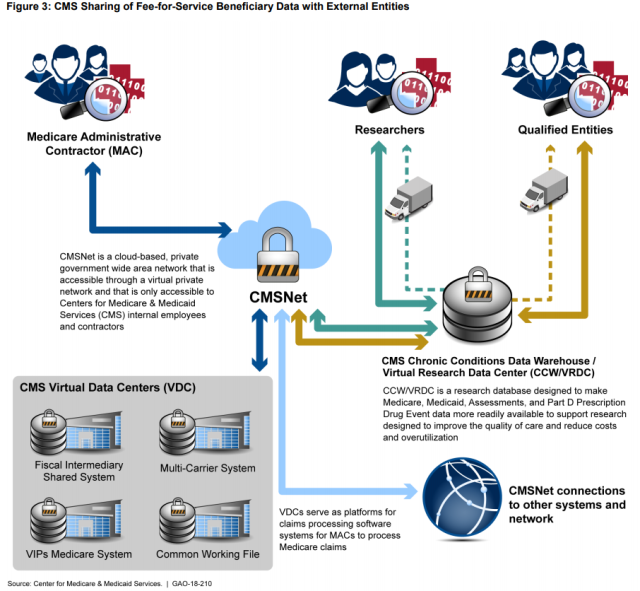Is Your Medicare Information Safe?
- Medicare Administrative Contractors (MAC) use this data to process the payment of Medicare benefits.
- Researchers use this data to study how recipients get health care services.
- “Qualified entities”—public or private organizations responsible for reporting on provider performance for one or more locations—use this data to determine how well Medicare service providers and equipment suppliers are performing.
 Is Guidance for Guarding Personal Information Being Followed?
CMS has set requirements that follow federal standards for MACs and qualified entities about guarding personal information. However, while researchers are required to follow federal standards, they are not given detailed guidance on which specific security measures to put in place. CMS notes that when researchers don’t have to follow specific guidance, they have more flexibility to assess security risks and decide which security measures to use. But this flexibility may result in researchers not using security measures that meet CMS standards. We recommended that CMS establish specific guidance for researchers so that they put in place security measures that are consistent and effective.
Who Ensures that Security Measures Are Effectively Carried Out?
In addition to setting requirements for MACs, researchers, and qualified entities, CMS must ensure that these groups are effectively carrying out CMS’s security measures. While assessing effective performance is a good management practice, the Federal Information Security Management Act also requires this. CMS is specifically required to assess the MACs under the Medicare Prescription Drug, Improvement, and Modernization Act of 2003.
We found that CMS is performing assessments for MACs but is not always tracking their findings effectively. We recommended that CMS track all findings for MACs and set up oversight programs for qualified entities and researchers. Currently, CMS does not have assessment programs for these groups.
Check out our full report to learn more.
Is Guidance for Guarding Personal Information Being Followed?
CMS has set requirements that follow federal standards for MACs and qualified entities about guarding personal information. However, while researchers are required to follow federal standards, they are not given detailed guidance on which specific security measures to put in place. CMS notes that when researchers don’t have to follow specific guidance, they have more flexibility to assess security risks and decide which security measures to use. But this flexibility may result in researchers not using security measures that meet CMS standards. We recommended that CMS establish specific guidance for researchers so that they put in place security measures that are consistent and effective.
Who Ensures that Security Measures Are Effectively Carried Out?
In addition to setting requirements for MACs, researchers, and qualified entities, CMS must ensure that these groups are effectively carrying out CMS’s security measures. While assessing effective performance is a good management practice, the Federal Information Security Management Act also requires this. CMS is specifically required to assess the MACs under the Medicare Prescription Drug, Improvement, and Modernization Act of 2003.
We found that CMS is performing assessments for MACs but is not always tracking their findings effectively. We recommended that CMS track all findings for MACs and set up oversight programs for qualified entities and researchers. Currently, CMS does not have assessment programs for these groups.
Check out our full report to learn more.
- Questions on the content of this post? Contact Nick Marinos at MarinosN@gao.gov.
- Comments on GAO’s WatchBlog? Contact blog@gao.gov.

GAO's mission is to provide Congress with fact-based, nonpartisan information that can help improve federal government performance and ensure accountability for the benefit of the American people. GAO launched its WatchBlog in January, 2014, as part of its continuing effort to reach its audiences—Congress and the American people—where they are currently looking for information.
The blog format allows GAO to provide a little more context about its work than it can offer on its other social media platforms. Posts will tie GAO work to current events and the news; show how GAO’s work is affecting agencies or legislation; highlight reports, testimonies, and issue areas where GAO does work; and provide information about GAO itself, among other things.
Please send any feedback on GAO's WatchBlog to blog@gao.gov.
